Easy buttermilk scones are classic oven scones that have been made with buttermilk. For me a traditional homemade scone is the perfect weekend breakfast or an afternoon treat with friends, serve with a cup of tea and a pot of homemade jam.
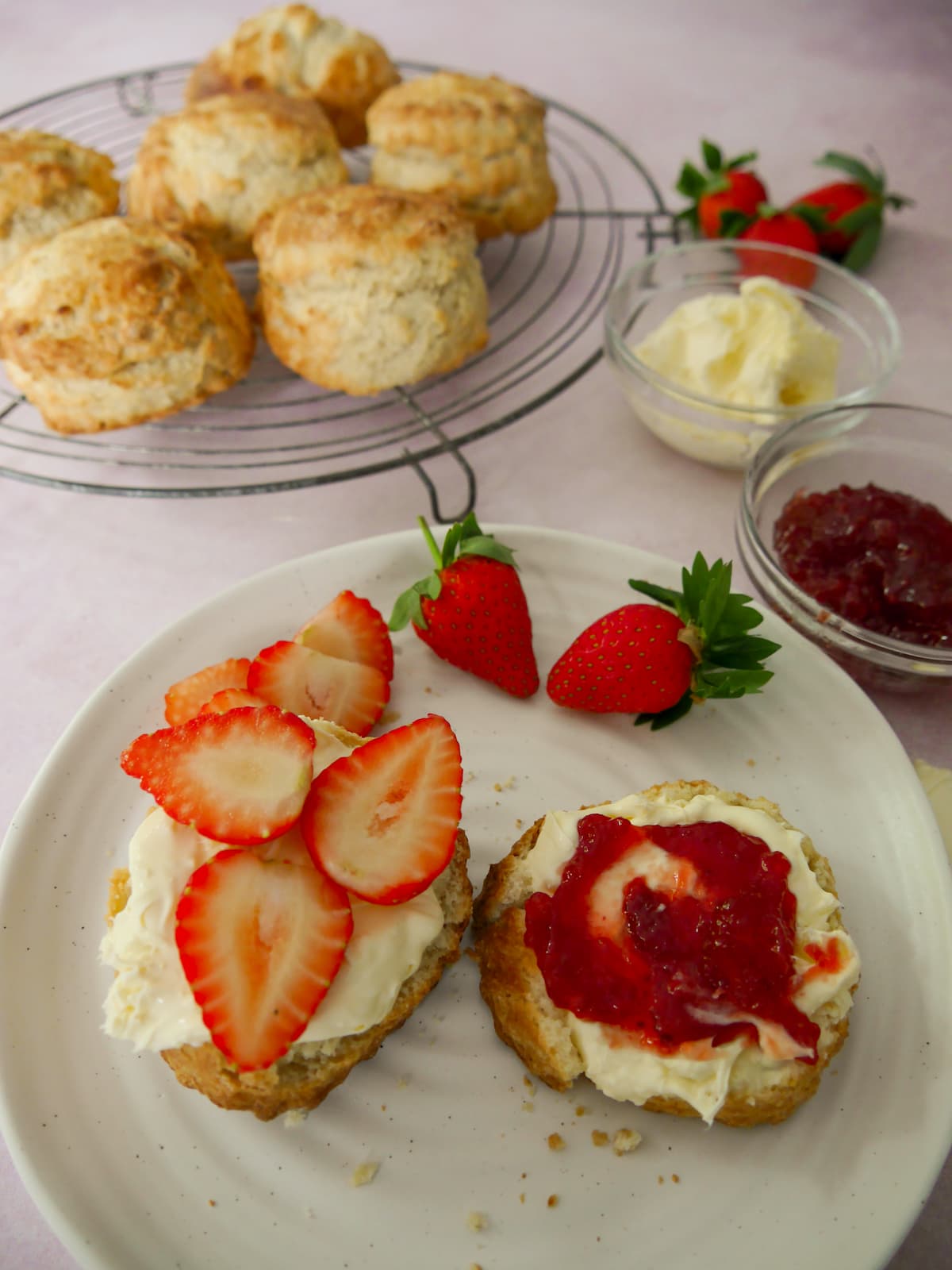
These easy buttermilk scones are a favourite bake of mine. I am by no means a fancy baker, but I love baking and what I am best known for with family and friends are these classic buttermilk scones.
I make the best buttermilk scones, however, I have friends who say that they struggle to bake a decent scone. Some complain about the lack of rise, others say their scones are tough and dense. Worst offence of all are those loaded with baking powder to make them rise (which sets your teeth on edge)!
The trick to any scone is to remember that scone dough needs a light hand and it is essential not to overwork the dough! Most of the problems people tell me about when they are baking scones are the result of too heavy a hand and overworking the dough.
Why you’ll love this recipe
- I show you how to bake scones with a few simple ingredients that most of you will have in your stores at home.
- Following a few basic guidelines, this recipe is fails-safe and it turns out great tasting, light and airy scones, time after time.
- Once you’ve learned the basics you can then get creative and start adding in extra flavours.
- This recipe can be easily doubled or halved to make a larger or smaller batch of scones.
Recipe ingredients
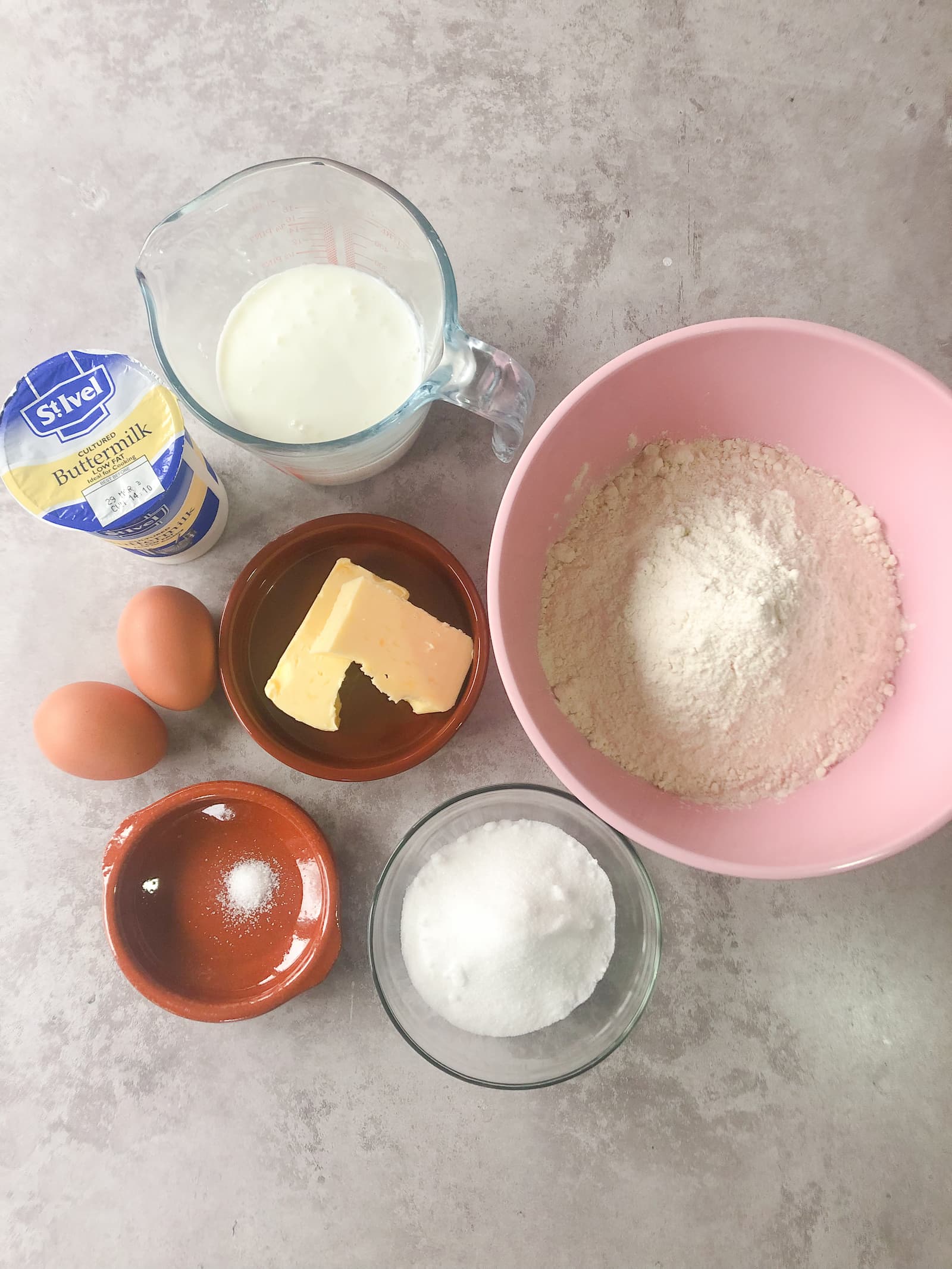
- FLOUR: I use self raising flour.
- SUGAR: I use caster sugar as it has a finer texture than granulated sugar.
- BUTTER: I use unsalted butter and a pinch of salt in a scone dough. The butter should be chilled from the fridge which makes it easier to rub through the flour and sugar. If using salted butter omit the salt.
- EGGS: I use 2 medium free-range eggs to bake a batch of scones. If using large eggs, cut back a little on the buttermilk.
- BUTTERMILK: I use buttermilk which bake the best oven scones, however you can use regular milk if you prefer.
How to bake scones
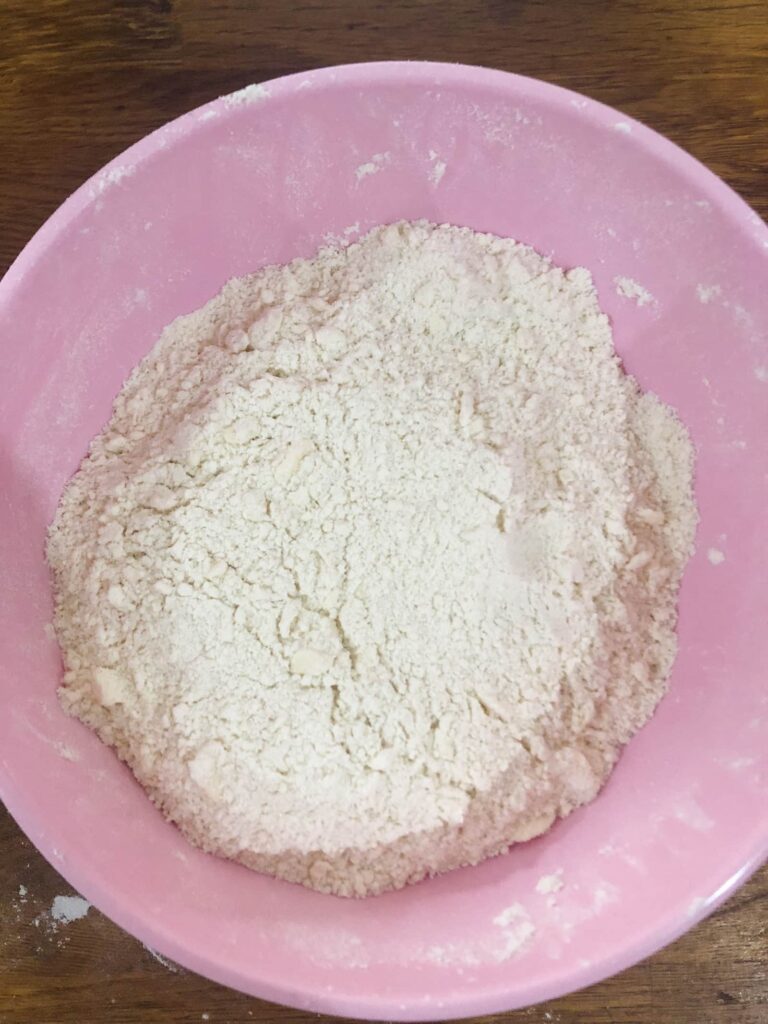
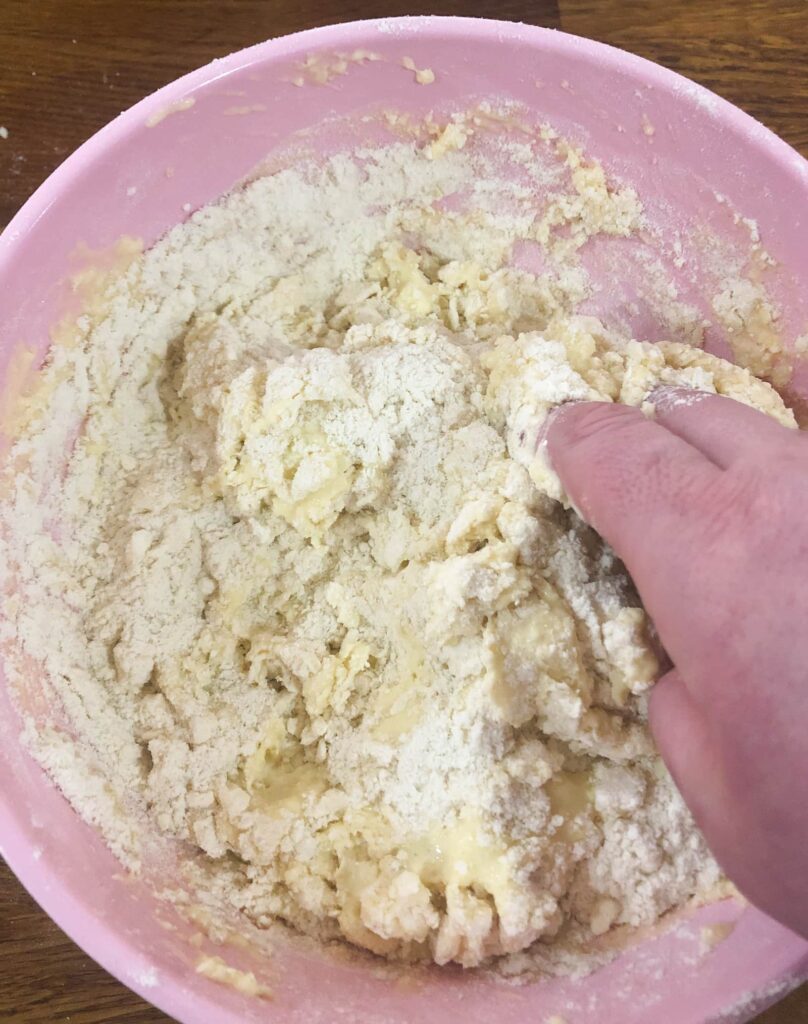
- Combine the flour, sugar and salt in a large mixing bowl.
- Add chilled butter, rub together gently until the mixture looks like fine breadcrumbs.
- Do not press the mixture together.
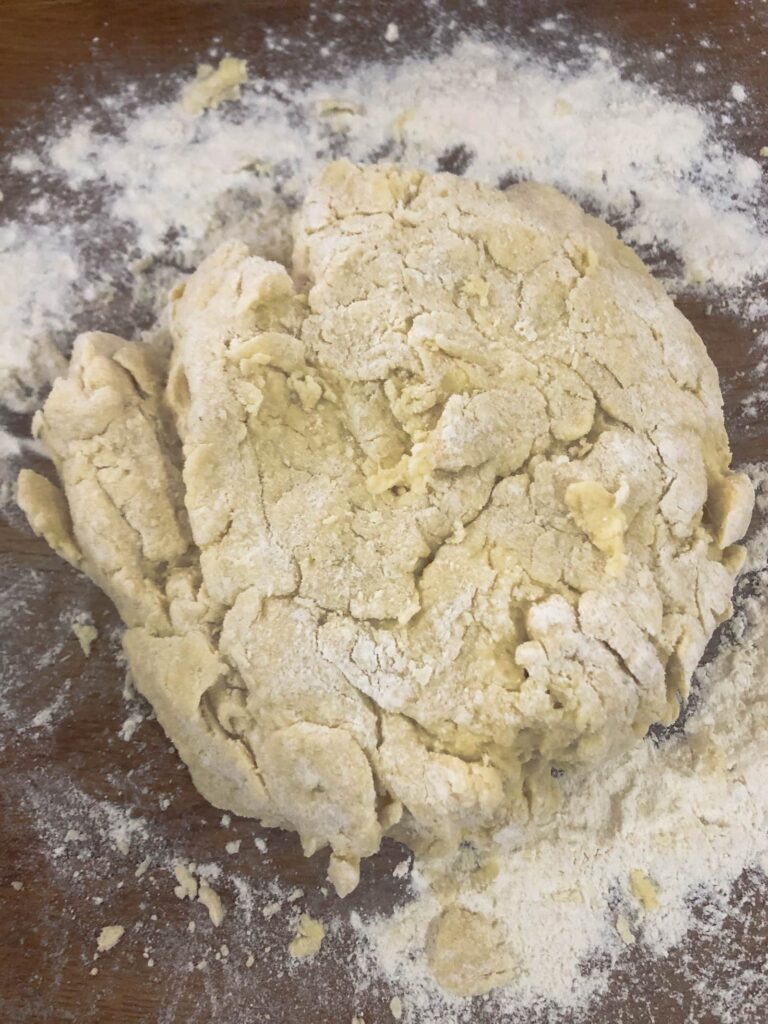
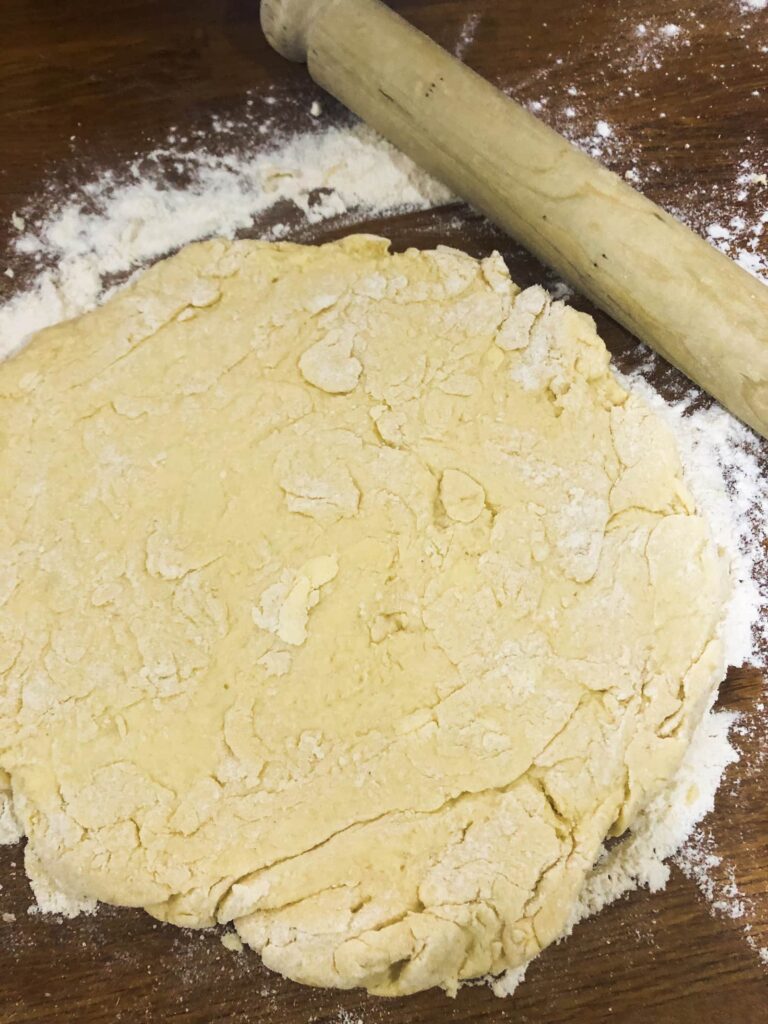
- Beat eggs with the buttermilk, add to the dry mixture and combine using a round knife.
- Then use your hands to gently bring the dough together into a ball.
- Place the dough onto a floured surface and roll out to around 3cm thickness using a well floured rolling pin.
- If you don’t have a rolling pin, pressing gently with the back of your hand to flatten the dough.
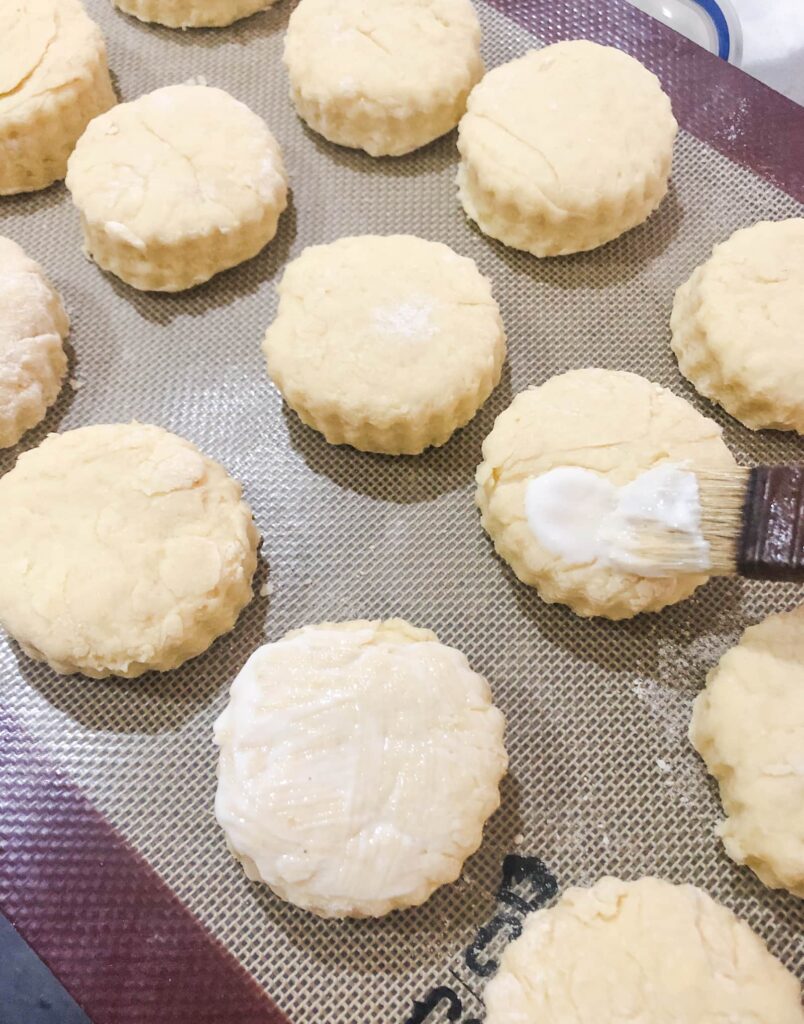
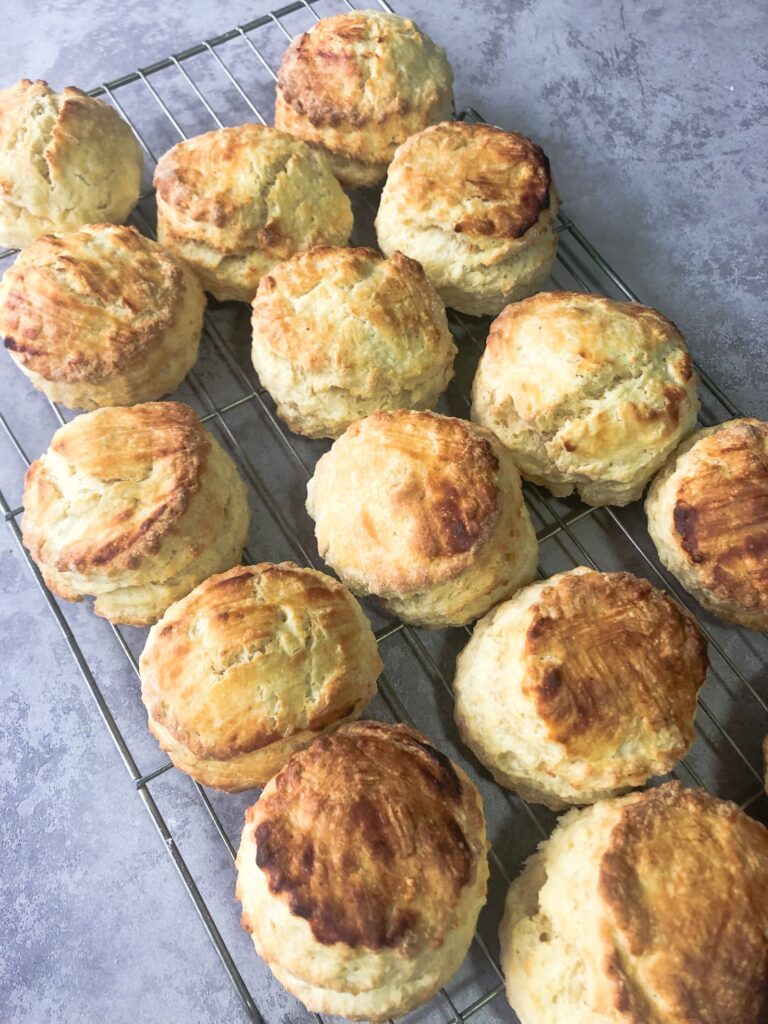
- Using a 6cm round cutter stamp out your scones and place them on a greased and floured baking sheet.
- Using a pastry brush, brush the top of the scones with the remnants of the buttermilk mixture left in the measuring jug to give a golden top to the scones.
- Bake in a pre-heated oven at 180C/200CFan for 16-18 minutes or until the scones have turned golden on top.
- Once baked, remove the scones from the oven and pop them onto a wire tray to cool a little.
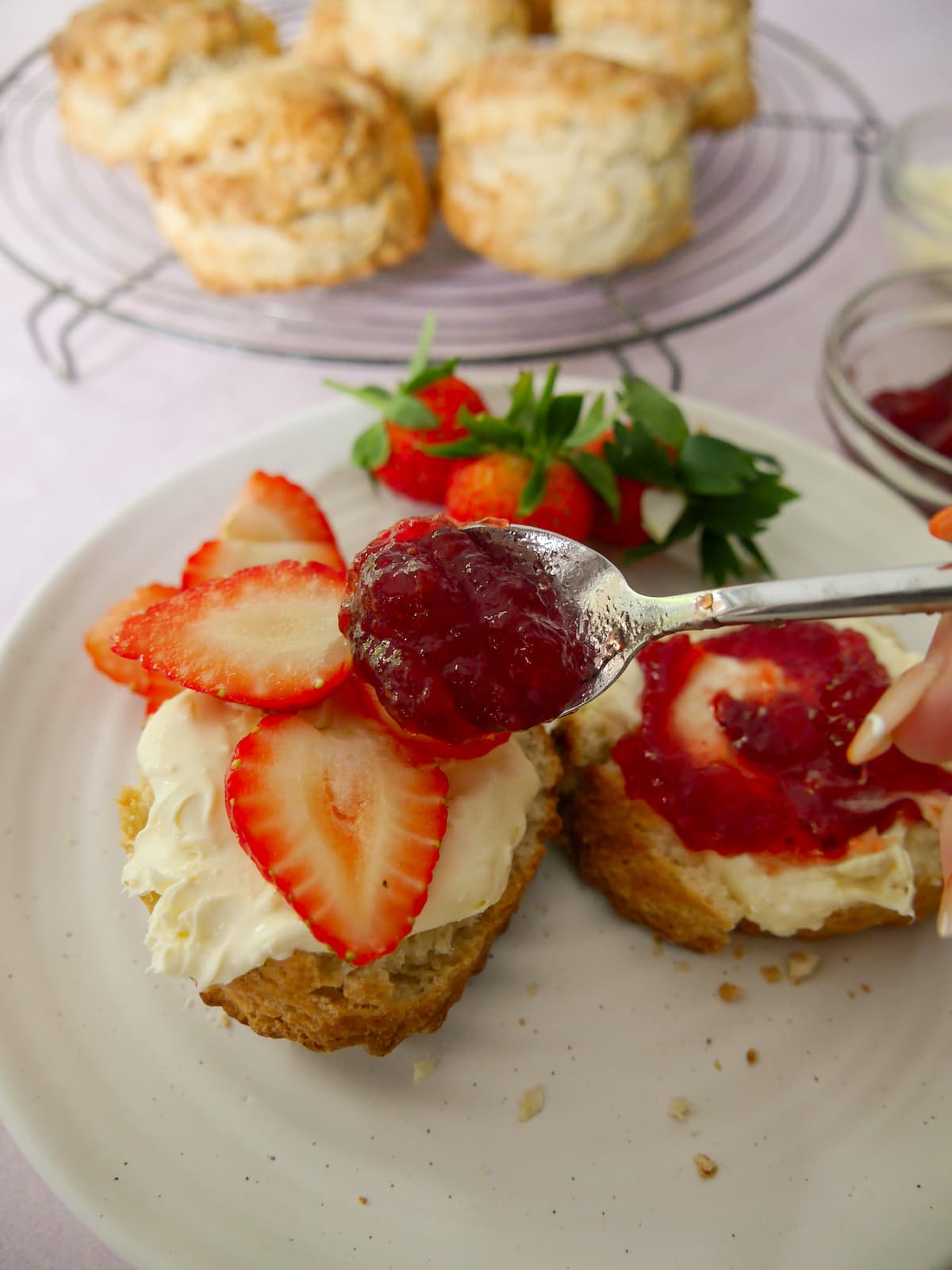
How to serve scones?
Scones are at their absolute best served warm, straight from the oven. In my case with a nice hot cup of tea or coffee. Here are some topping suggestions for your scones:
- butter
- clotted cream; whipped cream or whipped double cream
- any flavour of jam or jelly, try:
- Rhubarb & Ginger Jam
- Scottish Raspberry Jam
- Scottish Strawberry Jam
- Blackberry (Bramble) Jelly
- Blackcurrant Jelly
- Apple Jelly
- any flavour of curd: lemon; blackcurrant; try Easy Clementine Curd, Fresh Fig Curd, or Easy Strawberry Curd.
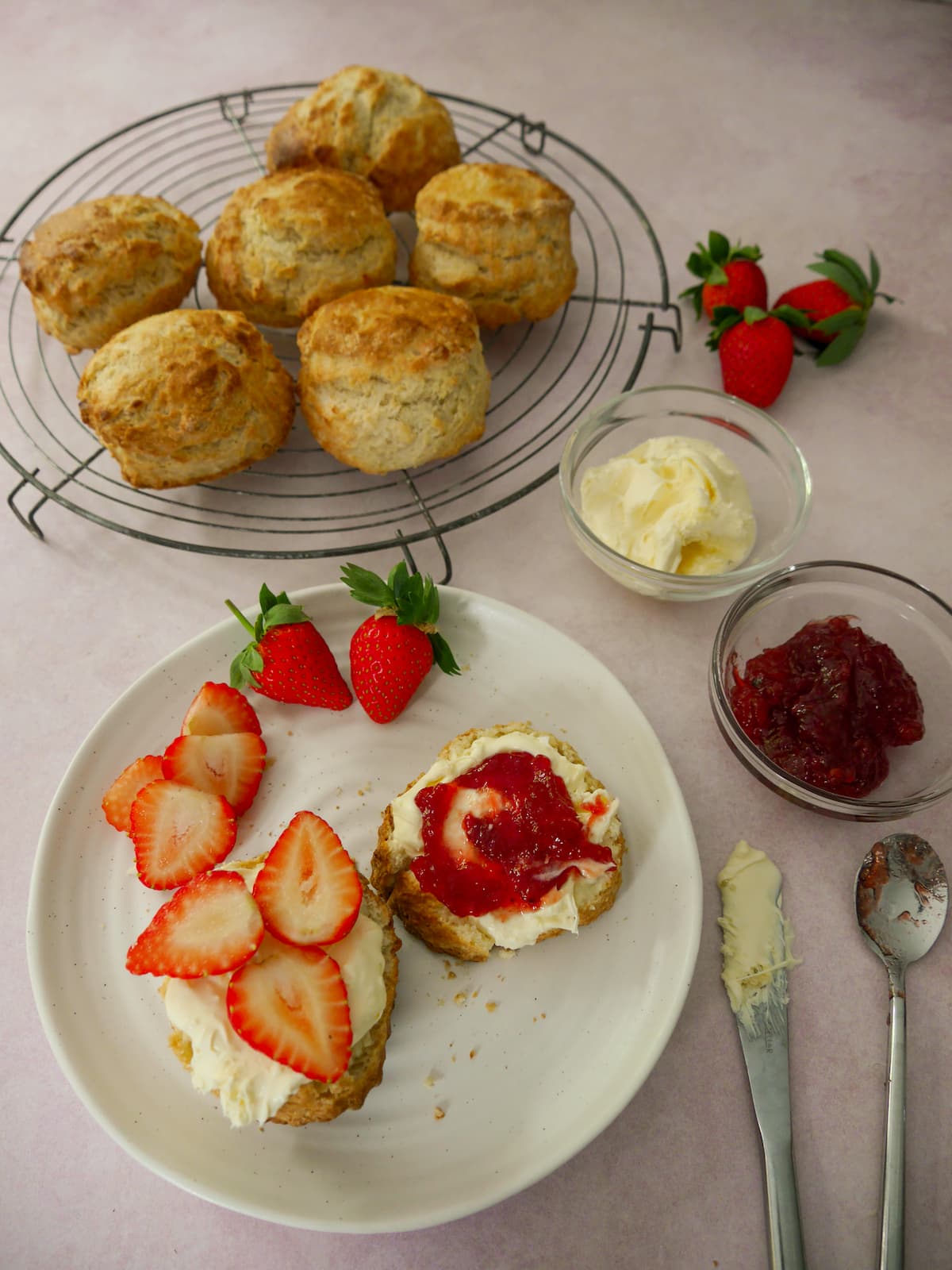
5 top tips for baking a light scone
A good scone should have a good rise and a light and open texture. I do not add baking powder to this basic scone recipe, instead I follow these 5 simple steps:
- Bring the dough very gently together with your hands, take care not to be too heavy handed, try to use your fingers rather than the palm of your hand.
- Once combined into a rough ball, place on a very well floured surface. If using a rolling pin add a generous amount of flour to that too. You don’t want the dough sticking to either the board or your rolling pin.
- Gently roll the dough to around 2.5cm – 3cm in depth before cutting and placing onto the baking sheet and baking in the oven.
- DO NOT twist the pastry cutter, just press it down into the dough. If you twist the cutter your scones won’t rise as well.
- Cut the first round of scones then gently bring the leftover dough together again before cutting more scones to use up the remaining dough.

Other flavour combinations for scones?
I use this basic buttermilk scone recipe as a base for all my other scone recipes. Get creative with the flavours, here are some suggestions:
- dried fruits: sultanas; raisins; apricot; cranberry
- fresh fruits: apple; pumpkin (puree); lemon zest; blueberry; strawberry
- chocolate chips: dark; milk or white
- cheese: cheddar; comte; gruyere; blue
- fresh or dried herbs: chives; thyme; wild garlic; oregano; parsley
This is by no means an complete list, get creative and add any flavour you like using the scone as a base. However a few points worth noting if you are playing with the recipe:
- When it comes to savoury scones, cut out the sugar entirely.
- Adding heavier ingredients will affect the overall rise of the scone.
- These easy buttermilk scones contain no baking powder as the eggs do all the hard work. However, if adding flavours add a teaspoon of baking powder to the dough so that the scones will still rise with the heavier ingredients.
- You may also need to adjust the amount of liquid. For example apple is a wet fruit so you need to add a little less buttermilk and egg into the dough.
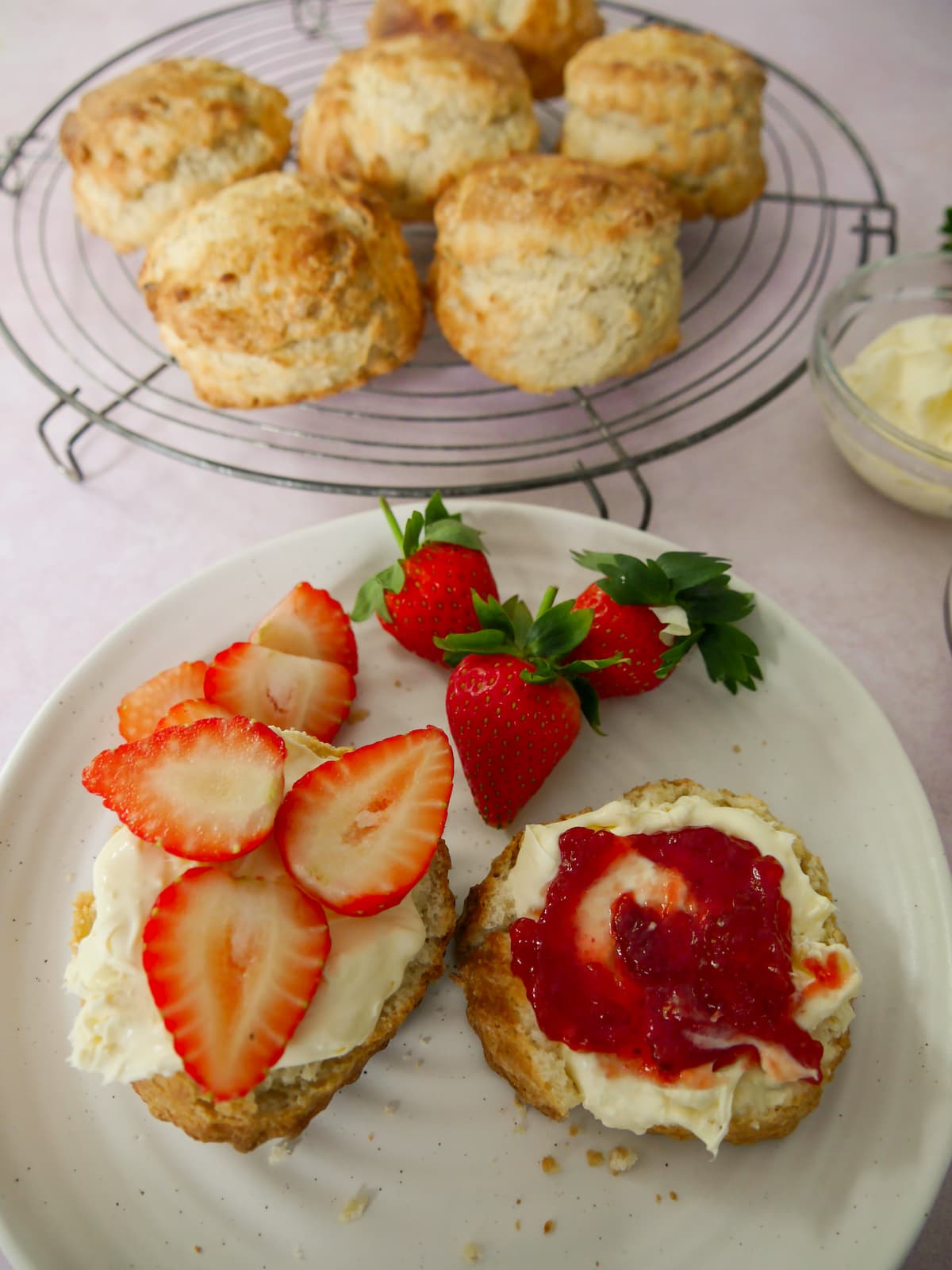
FAQs
The trick to making a light and fluffy scone is not to overwork the dough, gently bring the dough together and don’t over-knead it. The more you work the dough
Yes, absolutely, you can use the same quantity of whole milk. You can also make your own buttermilk, by combining milk with a teaspoon of white wine vinegar or lemon juice.
Bake scones at 180C/200CFan for 18-20 minutes. Take care not to over-bake the scones as they will become dry and crumbly.
Although scones are best served warm, straight from the oven; leftover scones can be kept in an airtight container and warmed up gently in the oven for the next day or so.
Scones freeze really well! Once baked simply allow to cool completely on the wire rack before placing in an airtight container in the freezer for up to 3 months. When ready to enjoy, defrost and warm up in the oven before serving.
Pin the recipe
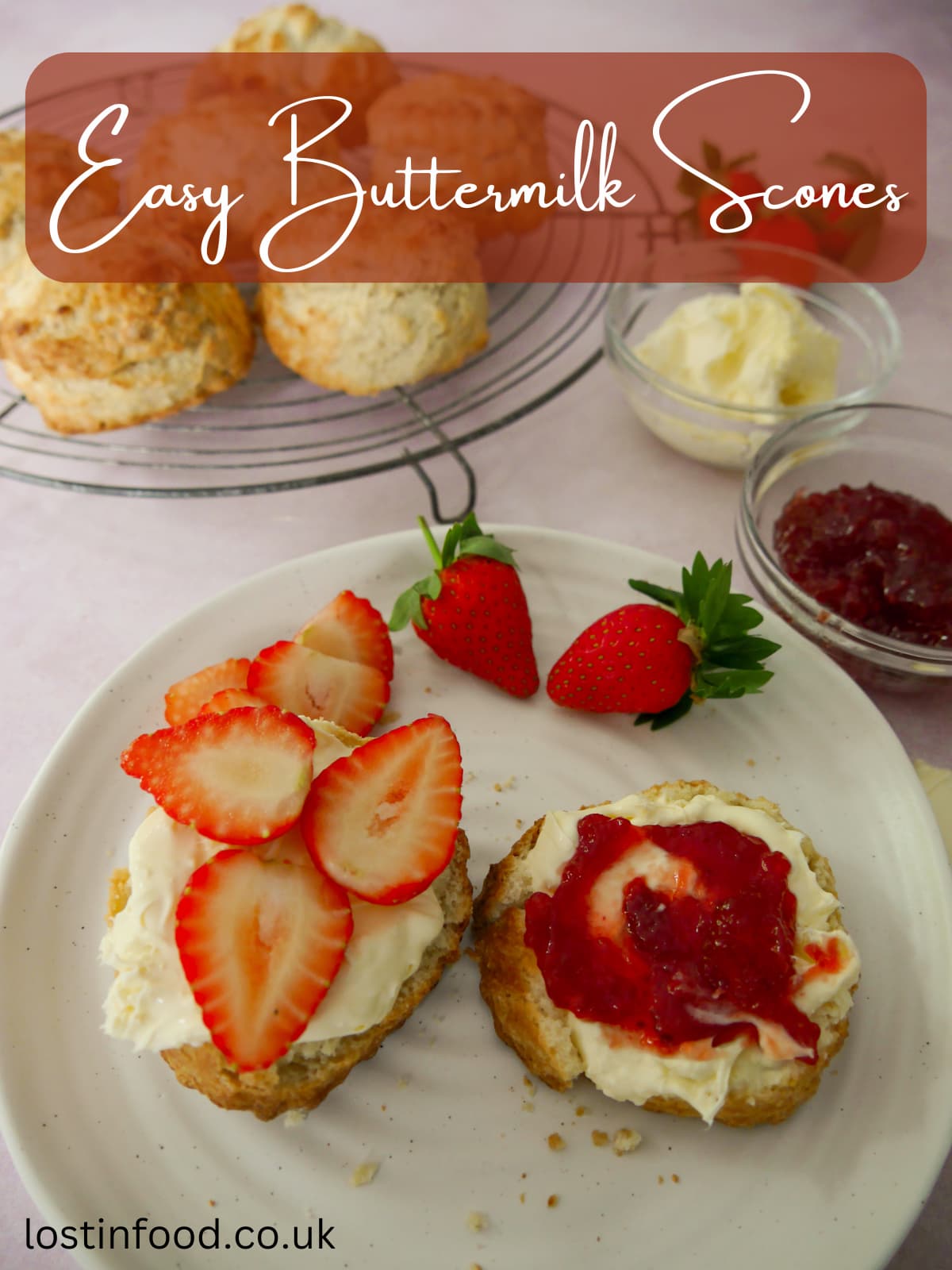
Additional recipe suggestions:
Love scones then why not try some of these great tasting recipes:
- Buttermilk Cheese Scones
- Pumpkin Scones
- Apple & Cinnamon Scones
- Scottish Pancakes (also known as Drop Scones)
- Traditional Rock Cakes (also known as Rock Buns)
If you enjoyed this bake have a look at our Ultimate Guide to Baking with Kids, full of great recipe suggestions for baking with children.

Easy Buttermilk Scones
Ingredients
- 500 g self raising flour
- 100 g caster sugar
- pinch salt
- 100 g unsalted butter (chilled from fridge and diced)
- 2 medium free-range eggs
- 200 ml buttermilk
Instructions
- In a large mixing bowl combine the flour, sugar and salt. Add the chilled butter and rub together gently through your fingers until the mixture looks like fine breadcrumbs. Do not press the mixture together.
- Beat the eggs with the buttermilk and add to the dry mixture and mix using a round knife. Use your hands to gently bring the dough together into a ball. (Take care not to over-work the dough as this will only result in dense, heavy scones. The lighter the handling the lighter the scone).
- Place the dough onto a floured surface and roll out to around 3cm using a floured rolling pin. (If you don’t have a rolling pin pressing gently with the back of your hand will suffice). Using a 6cm round cutter stamp out your scones and place them on a greased and floured baking sheet. Using a pastry brush, brush the top of the scones with the remnants of the buttermilk mixture left in the measuring jug to give a golden top to the scones.
- Bake in a pre-heated oven at 180C/200CFan for 16-18 minutes or until the scones have turned golden on top. Remove from the oven and serve.
Notes
• Please note that the nutrition information provided above is approximate and meant as a guideline only •

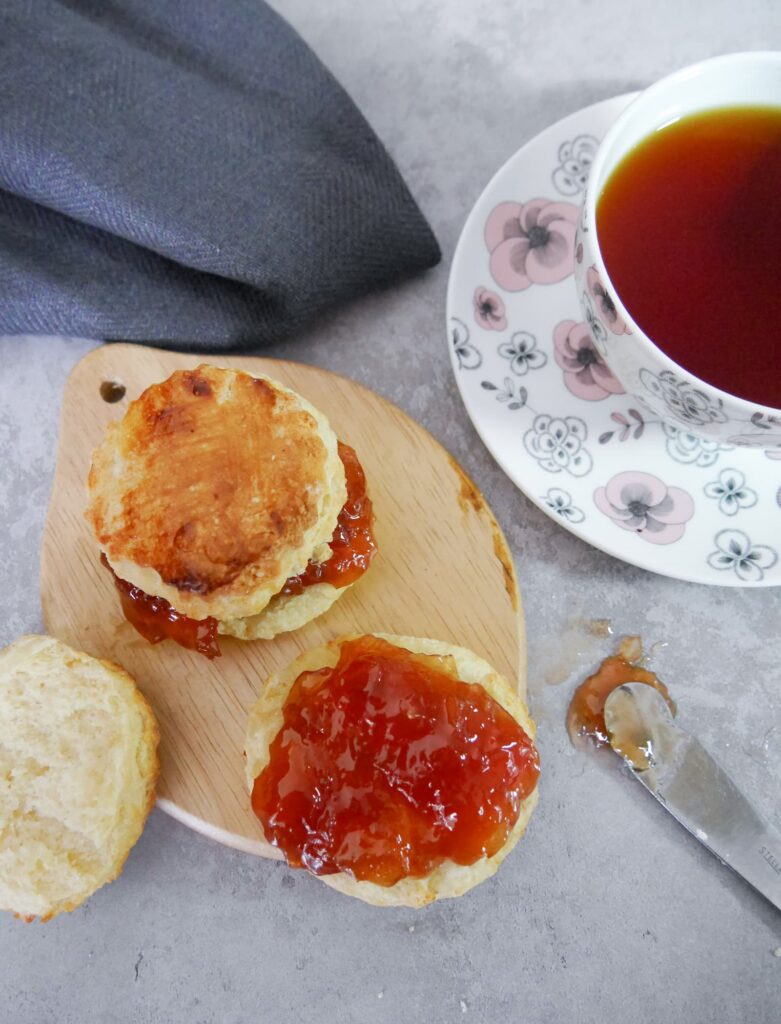
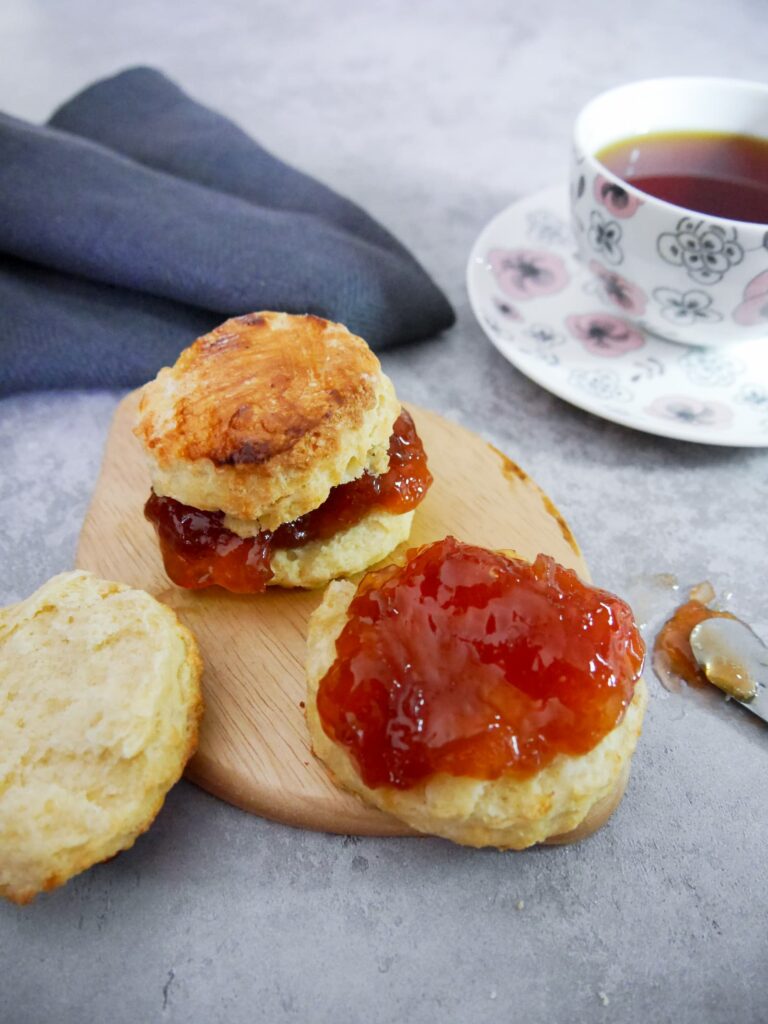
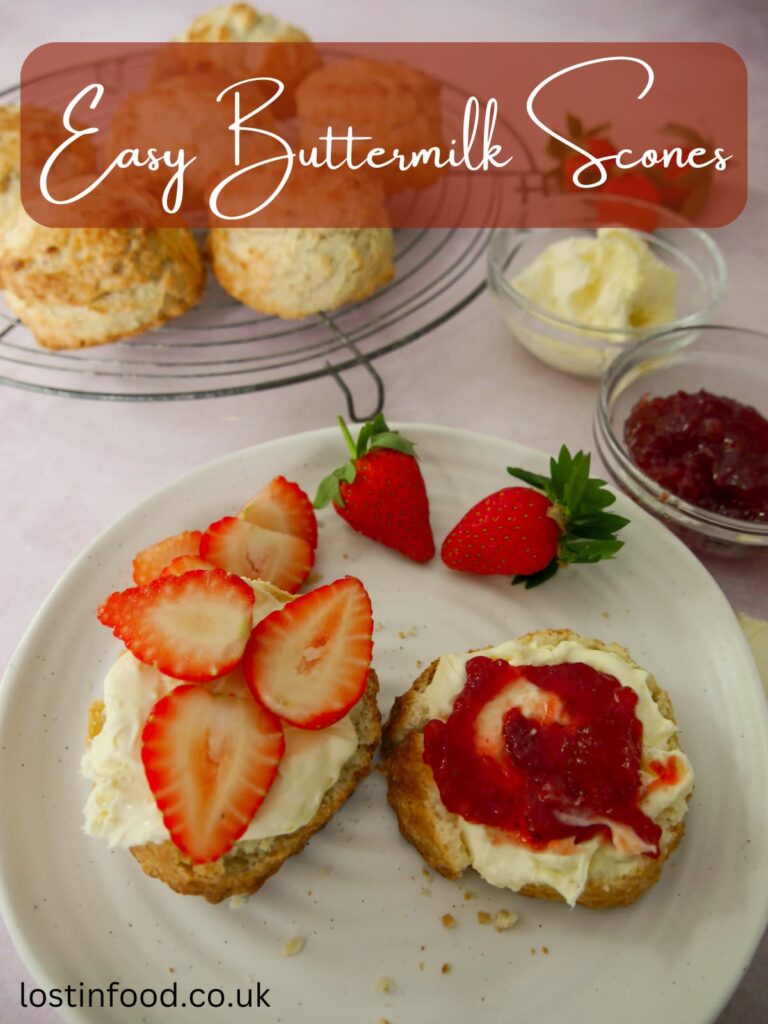
Cat
Thursday 27th of April 2023
These scones turned out great! So light and fluffy, I’ll definitely be making them again soon.
Lesley
Thursday 27th of April 2023
Thank you Cat, I'm really glad you enjoyed them.
Chloe
Thursday 20th of April 2023
Yum, I love scones made with buttermilk, this is my go to recipe whenever I have some after making homemade butter!
Lesley
Thursday 20th of April 2023
Thank you Chloe, thanks for sharing that great idea. I'm going to make my own butter which I've never tried, then use the leftover buttermilk to bake scones.
Date and Walnut Scones | Farmersgirl Kitchen
Saturday 13th of June 2020
[…] Buttermilk Scones – Lost in Food […]
Jacqui Bellefontaine
Saturday 16th of November 2019
Love how you two became friend. any foodie will know the how divine a well baked scone is. It made me think about friends i made through food and apart more recent friends made through a local dinner club. My two best friendships that have stood the test of time came about through food. My 1st through studying Home Economics together and being partnered fro cookery classes our skills complimented each other so me a made a good team, The other was when i invited a friend of a friend whom i met once before to Christmas dinner in June back in the 80s I was working on a photoshoot for a magazine and i didnt want all the food to go to waste.
Michelle
Sunday 17th of November 2019
Thanks Jacqui, it is true, the love of food and friendship go hand in hand. Our skills too compliment each other which is why I think we work so well with each other, that and our agreed commitment to be utterly honest with each other! So glad to hear you've made some life long friends through the love of food.:-) Cheers, Michelle x
Janice
Saturday 2nd of February 2019
These look like epic scones, buttermilk makes all the difference to the rise.
Lesley
Sunday 3rd of February 2019
Thank you Janice, buttermilk does indeed make a big difference and cuts out the need for raising agent. This scone recipe is how Michelle and I first struck up a friendship. She’d heard I made the best scones and asked if I’d share the recipe. Friends ever since. Lesley x